#MA UL
Explore tagged Tumblr posts
Text

Cum ma simt cand vreau sa adaug o melodie intr un playlist dar vad ca e deja acolo (sunt mereu cu 2 pasi inainte)
#romanisme#s a intamplat de prea multe ori#sunt prea buna efectiv#spotify#spotify ma tine in viata da wrapped ul ala a vrut sa ma omoare#cel mai tampit wrapped lowk#:3#am prea multe playlist uri#si sunt bazata pt asta
11 notes
·
View notes
Text
That's it. That's the last brain cell gone. He's been trying to turn the boxflaps into a tunnel for 15mins now.
#ooc things#my cat#im dying#hes headbutted the sofa 3 times now#orange cat#feo ul#ginger cat#cats are very smart creatures#cats of tumblr#ma cat#cats
79 notes
·
View notes
Text
KH Mas Abdurrahman Al Janakawi: Jejak Perjuangan Mathla'ul Anwar Menuju Gelar Pahlawan Nasional
“Pahlawan sejati berjuang dengan pena dan akhlak. KH Mas Abdurrahman Al Janakawi telah mewariskan pendidikan berbasis nilai melalui Mathla’ul Anwar. Indonesia hanya akan maju jika cerdas dan berkarakter. Sudah saatnya beliau diakui sebagai Pahlawan Nasional.” Bung Eko Supriatno RASIOO.id – Beberapa waktu lalu, penulis berkesempatan berdiskusi dengan Prof. Dr. Mufti Ali, seorang peneliti…
#Eko Supritano#KH Mas Abdurrahman Al Janakawi#Mathla&039;ul Anwar#Pahlawan Nasional#Prof. Dr. Mufti Ali#Sejarah Banten
0 notes
Text
اسلامیت اور مغربیت میں سیاسی کشمکش
اسلامیت اور مغربیت میں سیاسی کشمکش اسلامیت اور مغربیت میں سیاسی کشمکش مولانا ابو الحسن علی ندوی رحمہ اللہ کی کتاب ہے۔ اسلامیت اور مغربیت میں سیاسی کشمکش مولانا ابو الحسن علی ندوی رحمہ اللہ کی بہترین کتاب ہے جسے حال ہی میں وفاق المدارس العربیہ پاکستان کے نصاب میں شامل کیا گیا ہے۔ اسلامیت اور مغربیت میں سیاسی کشمکش اسلامیت اور مغربیت میں سیاسی کشمکش نامی اس کتاب میں بنیادی طور پر یہ سمجھایا گیا ہے…

View On WordPress
#: Maulana Bilal Abdul Hai Hasani Nadvi Books#darse nizami books#darse nizami course#free book#Muslim Mamalik Me Islamiyat Aur Magribiyat Ki Kash Ma Kash#wifaq ul madaris nisab#اسلامیت اور مغربیت میں سیاسی کشمکش#درس نظامی نصاب#مولانا ابو الحسن علی ندوی
0 notes
Text

This is Feo Ul. He likes to assault the top of his tree so viciously he usually falls off it and into the basket beneath.
Not a thought behind those eyes.
Requesting Cute Pet Photos :)
15K notes
·
View notes
Text
What is verisimilitude?
A young woman committed suicide by jumping from the top of the building after surviving when her mother jumped from the top of the building with her in her arms. Why does a writer have to play by any rules when truth is stranger than fiction?
I read a somewhat popular book recently by an author I’d read and really enjoyed previously. I was excited to devour the novel, but was bitterly disappointed with the ending. Why? It just didn’t make sense. It didn’t ring true. There’s no way the protagonist would have come to that decision. The novel lacked verisimilitude. Verisimilitude is defined as “the appearance of being true or real.”…

View On WordPress
#Author#Blogger#Creative Writing#Creative Writing MA#Imaginative Writing#Lisey&039;s Story#Mandi Bean#MasterClass#Readers#Reality is Ralph#Stephen King#UL#University of Limerick#Verisimilitude#Writer#Writing
0 notes
Text

The Jer(ule)ma has breached containment
2K notes
·
View notes
Photo

#LED #channel #letters #channelletters #channellettersign #sanctuary #cannabis #fastsigns #fast #signs #UL #3M #translucent #vinyl #danvers #northshore #signcompany #massachusetts #MA (at Danvers, Massachusetts) https://www.instagram.com/p/CoG0jYLsjFB/?igshid=NGJjMDIxMWI=
#led#channel#letters#channelletters#channellettersign#sanctuary#cannabis#fastsigns#fast#signs#ul#3m#translucent#vinyl#danvers#northshore#signcompany#massachusetts#ma
0 notes
Text
Updated: Kishite-Shabalic Script and a bit of the Kishic Language: Basics including an expanded list of nouns and verbs
I made this before but looking through it again I missed some things and made some mistakes, and so here is an updated version of this for y'all! As with the Kishite spoken language, the Kishic script descends from and is largely identical to the Shabalic script, thus the term Kishite-Shabalic. Kishite-Syllabic is one of three scripts used in Kishetal along with Kishic hieroglyphs (reserved for religious/cultic purposes) and the logographic Shetalic script, which has fallen almost entirely out of favour.
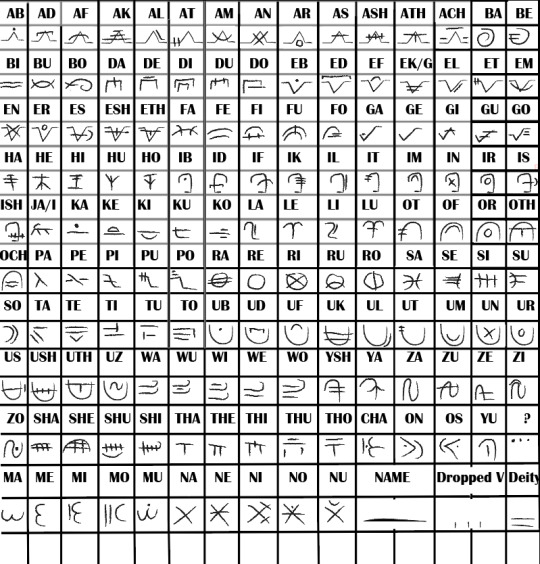
The Kishite-Shabalic script is syllabic, thus each symbol is representative of one syllable composed of a consonant and a vowel. In addition there are characters which serve as punctuation used to symbolize the conclusion of a thought, in similar fashion to the Latin "." and "?", and the presence of a proper noun or divine status. Though it should be noted that these are not always actually used.
Unlike the Shetalic script which is traditional formed using styluses pressed into clay, Kishite-Shabalic is typical written either through carving or the use of charcoal/ink.
Shetalic is shown below on the left with Kishite-Shabalic on the right, both say the same thing.

Keep reading for more linguistic babbling!
Vowels
As a general rule when transcribing the Kishite script, when two of the same vowel are put next to one another, they are treated as a single vowel, rather than elongated as we might see in English with words like book or meet or feat. Two different vowels, such as O and E, E and A, and so on, are almost never put directly beside each other. In the rare instances when this does occur the "stronger" of the two vowels will cover the other. The order of strength from least to greatest is as follows:
i-e-a-o-u
The vowels of the Kishite language are pronounced phonetically
Thus:
I as in sweet or pin
E as in egg
A as in palm
O as in coat
U as in tool
e.g. the substantive adjective "the Mighty" Urjali- + -ul (substantive ending) Urjaliul Urjaliul Urjalul (OOr-Jahl-OOl)
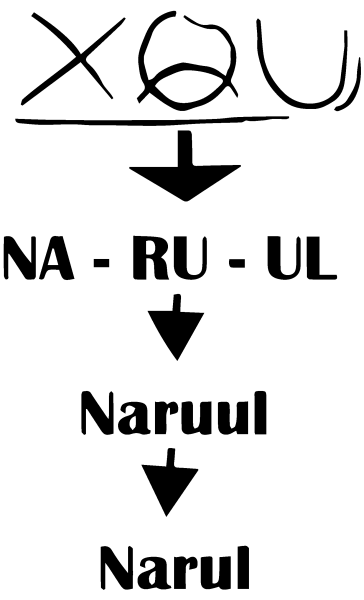
Special Note: One important differentiation between the Shabalic language and the Kishite language is that the Kishite language allows for the placing of multiple consonants in sequence. Take for example the Kishic name Ninma, in its original Shabalic form it would be Ninama (NI-NA-MA). Because of the fact that Kishite does have this trait, it has developed its own unique form of punctuation, the vowel drop. When placed below one of the syllabograms shown above, it cancels out the vowel, in essence rendering it mute. Ninma could alternatively be spelled using the formulation NI-IN-MA, similar to how Narul was spelled above, this is largely a matter of personal preference. The more traditional (Shabalic) form is often times considered more in keeping with nobility.
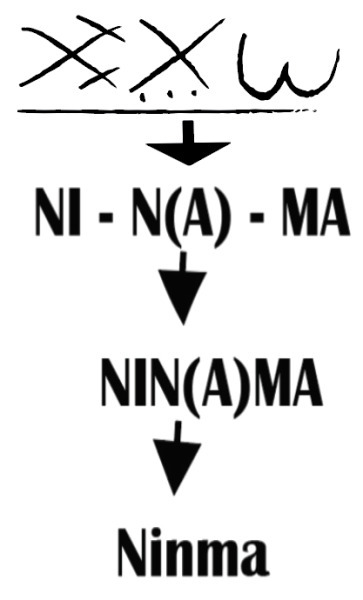
Sentence Structure
The Kishic language primarily follows a subject-object-verb structure.
Naru(u)l Nina(a)ma kimagiga(a)s Narul Ninma kimagigas. Narul Ninma carried. Narul carried Ninma.
Tamel kim(u)unur fabiguta(a)s Tamel kimunur fabigutas Tamel gates broke. Tamel broke gates.
Otilya (there is no -ia symbol in Kishite) Korithub luku ga. Otilya Korithub luku ga Otilia Korithia from is. Otilia is from Korithia
Enni Wi tuba chi Jahubur horu jawishaga The wind down the Mountain hard blows. The wind blows hard down the mountain.
Noun and Adjective Declensions
The Kishic language system consists of the following cases: nominative, genitive, dative, accusative, and possessive (the Shabalic language includes an instrumental case), and distinguishes between two numbers (singular and plural) and four genders, Masc/Neutral (undefined groups or individuals), Feminine, Inanimate, and Divine.
Divine beings such as gods and certain spirits as well as the Sun, Mountains, Rivers, and the Sea are always referred to in the Divine gender. Some monsters also fall under this category. (Water Bi (Inanimate), Lake Bi (Divine))
Objects which are not and have never been alive are rendered in the Inanimate gender. This can get confusing in some instances, for example while the word corpse Nahoku would utilize the masc/neutral form, the word bone, hashudi, would utilize the inanimate. Another example of this is the word Oli which can mean either blood or wine based on whether it utilizes masc/neut or inanimate declensions.
Not all inanimate objects are rendered into the inanimate. Words like spear shukala use the masc/neutral. This group typically consists of weapons and tools. The stem used will depend on the root word.
Plants as a rule are always rendered into the feminine.
Cities and countries are neutral.
Royal Titles have a specific declension.
A few examples of declension are given in the tables below.
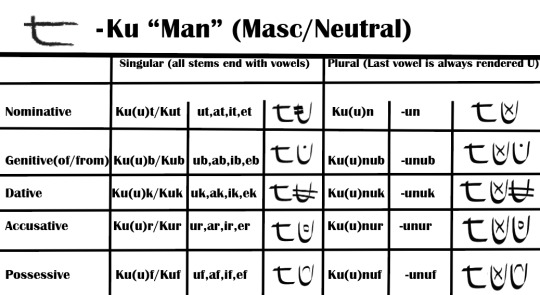

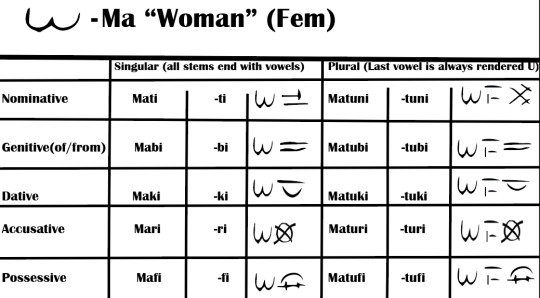
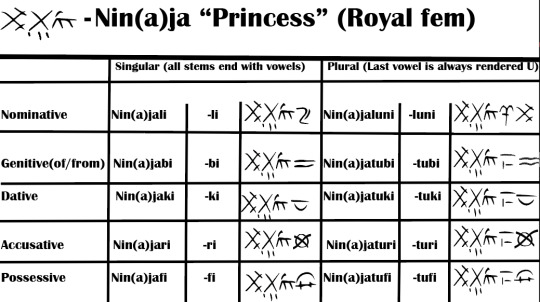


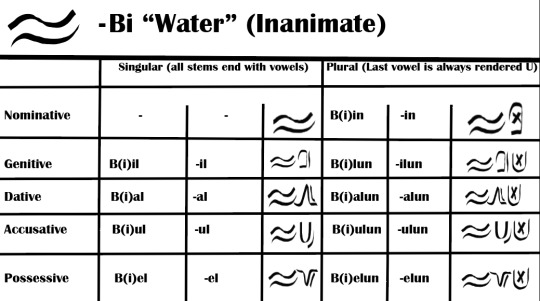
Sample Verbs
Verb stems always end with -i. The exception to this is the verb to be, which rather takes the form of the conjugation, thus the first person singular indicative present sample or "am" would be wa.
Talk: Akki
Breathe: Ki
Eat: Ushki
Struggle: Nari
Sleep: Eshsi
Fight: Orishri
Hunt: Pabakazi (Literally Bow art(ing))
Dance: Irteti
Kiss: Mishuzi
Copulate (and the more vulgar equivalent): Seshiti/Tu(u)ki
More verbs will be provided below.
Verbal Conjugation
There are two conjugation groups within Kishite verbs, the ha/za/hi-conjugation and the wa/ya/wi-conjugation. Which conjugation is used is dependent on the verb in question, typically words with a Shabalic root use the wa -conjugation while words derived from native languages more often use the ha -conjugation.
Within the Kishite language there are two voices (active and medio-passive), three moods (indicative, subjunctive, and imperative), three aspects (perfective, imperfective/continuous, and simple), and three tenses (Past, Present, and Future)
The present tense can be identified by -i/-a/-u/-o, past by -as/-os/-us, and future by -ad/-id.
Indicative: Used for Stating facts and thus the mood of reality.
Active: The Subject is the agent of the verb.
Mediopassive: The agent acts as a reflexive agent of the verb (acting upon itself) OR the subject is the target of the verb.
Present Simple Active: Narul is hungry Past Simple Active: Narul was hungry Future Simple Active: Ninma will not be hungry Present Simple Mediopassive: Narul is accompanied by Ninma/ Narul cleans (himself). Past Simple Mediopassive: Narul was accompanied by Suru Future Simple Mediopassive: Narul will be accompanied by Mikrab Present Perfect Active: Narul has slept Past Perfect Active: Narul had slept Future Perfect Active: Narul will have slept. Present Perfect Mediopassive: Bop has been carried Past Perfect Mediopassive: Bop had been carried Future Perfect Mediopassive: Bop will have been carried Present Imperfective/Continuous Active: Narul is walking Past Continuous Active: The Deep Sun used to speak Future Continuous Active: Zatar will be fighting Present Continuous Mediopassive: Bop is being carried Past Continuous Mediopassive: Bop was being carried Future Continuous Mediopassive: Bop will be being carried
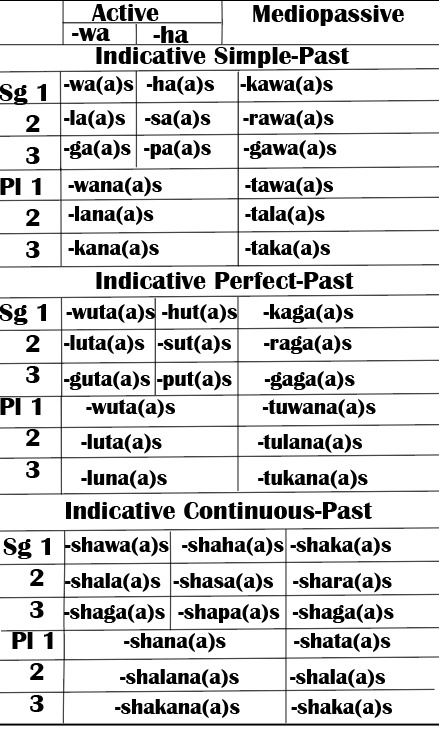

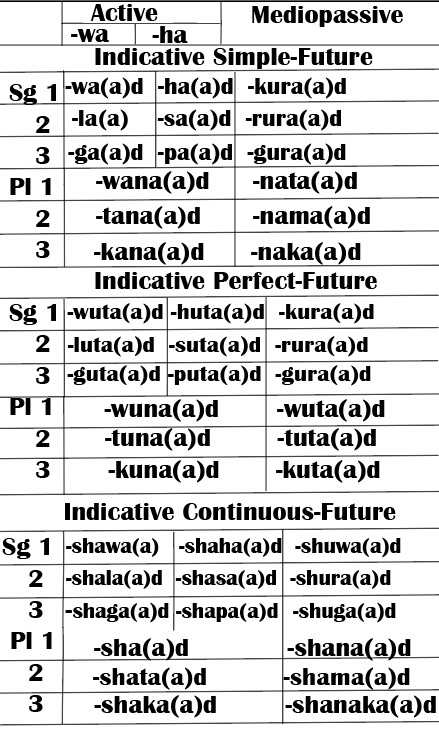
Subjunctive: Used for stating "unfacts", wishes and prayers, possibilities (may or might), hypotheticals, and opinions/judgements.
There is no Future conjugation for the Subjunctive, rather future events are expressed in the present through the use of may or might.
Additionally the Subjunctive is used for the following:
Jussive: used for suggestions and negative commands: What "should" or "should not" happen used only in the first person," we should leave/we should not leave" esh = should, na(e)sh = should not
Indefinite clauses: (if/until/whenever/whoever/however) ek = if, ekib = until, kowa(a)b =whoever, bowa(a)b = whenever, lowa(a)b = wherever, mowa(a)b = however
Purpose Clauses: "So that/ in order that" am = so that/in order that
Doubtful Assertions: "May not/Might not" er = may/maybe, na(e)r = may not, eb = might, nab = might not
Certain Future Assertions: "There certainly will..." erna = certainly (literally without maybe), na(e)rna = certainly not
Present Simple Active: We should run/ Narul wishes for rain Past Simple Active: Narul wished for rain Present Simple Mediopassive: If Ninma is stopped Past Simple Mediopassive: If Ninma was stopped Present Perfect Active: Narul has wished for rain Past Perfect Active: Narul had wished for rain Present Perfect Mediopassive: If Bop has been carried Past Perfect Mediopassive: If Bop had been carried Present Imperfective/Continuous Active: Narul is wishing for rain Past Continuous Active: Narul used to wish for rain Present Continuous Mediopassive: If Bop is being carried Past Continuous Mediopassive: If Bop was being carried
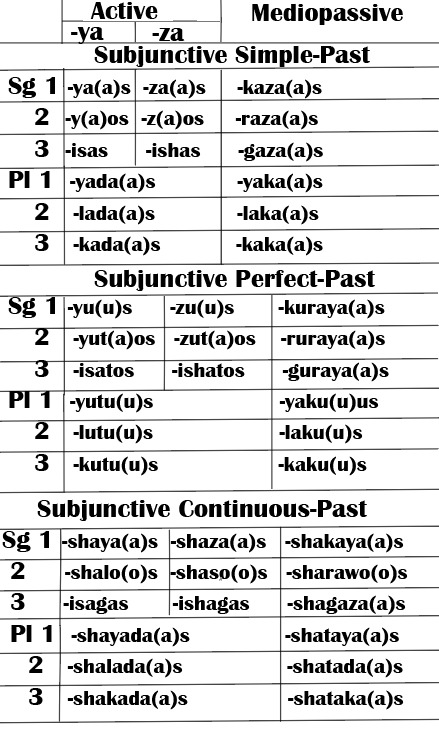
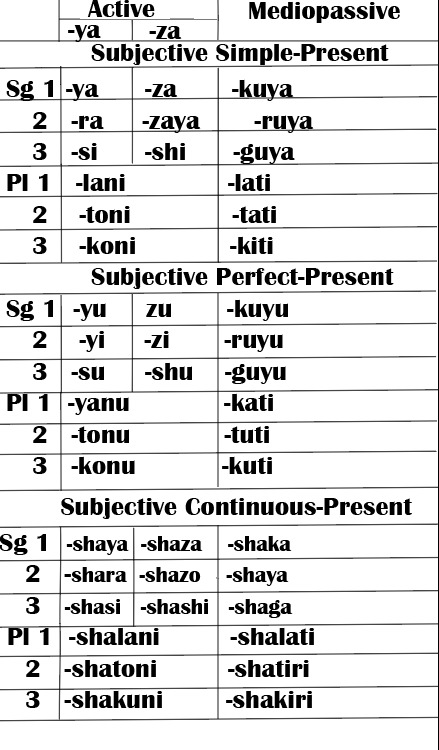
Imperative: Used for orders or commands/strong requests
Imperative is only conjugated in the second and third person singular or plural. Imperative is only used in the present and future, not for the past. Orders in the past are expressed as indicative. There are only Perfect and Imperfect Imperatives.
In the mediopassive form the imperative is translated as "Let them/you" for the first person of this the subjunctive is used "I/We should"
Present Perfect Active: Stop Future Perfect Active: You will stop Present Perfect Mediopassive: Let it stop Future Perfect Mediopassive: Let it be stopped. Present Imperfective/Continuous Active: Always stop Future Continuous Active: You will always stop Present Continuous Mediopassive: Let it be stopped (continuously) Future Continuous Mediopassive: Let it be stopped (continuously)
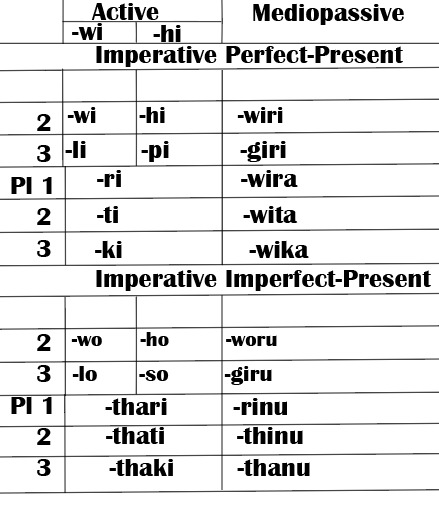
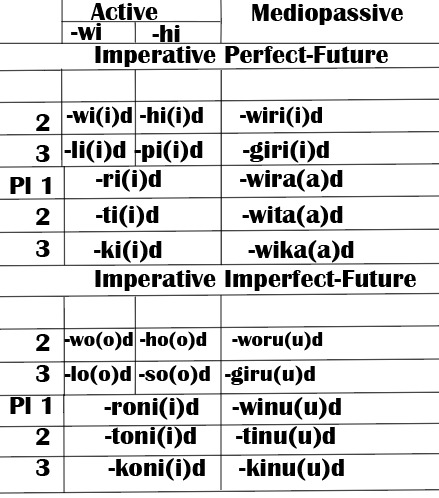
Additionally, the verbal system displays infinitives and participles in the present and past tenses.
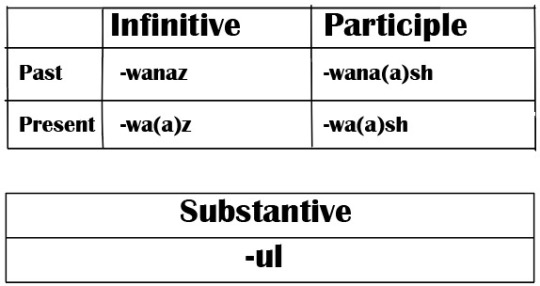
Prounouns
There are four genders of pronouns; Masculine, Feminine, Neutral, and Divine. Objects with the Inanimate designation are given neutral pronouns. Only deities receive divine pronouns, other entities and places in the divine categorization will typically receive feminine pronouns, with the exception of celestial bodies which always receive masculine pronouns.
It is considered improper to address both royalty and deities with pronouns, as such there are no specific first or second person pronouns for the Divine category.
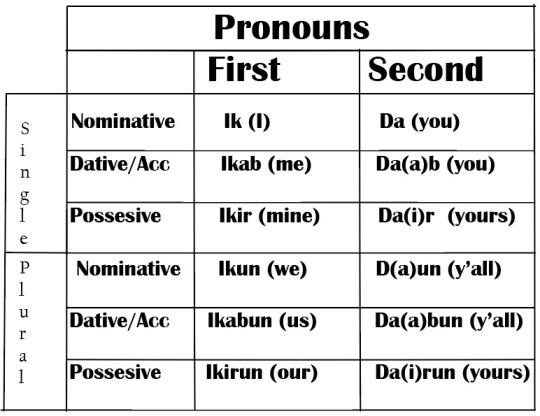
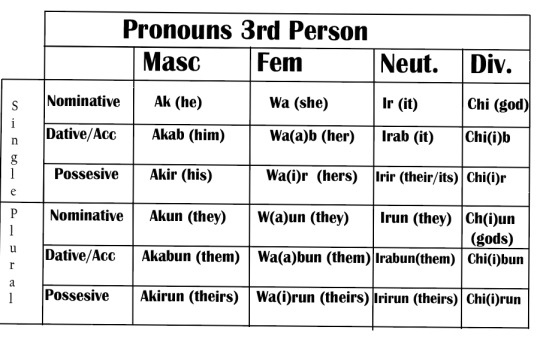
Articles
As with pronouns there is no "inanimate" article group, rather inanimate subjects are given masc/neut articles.

Stay Tuned for the ridiculously long Dictionary post that will be coming soon(ish)!
This post and the dictionary post are why, despite being back, I still haven't been all that active. I'll respond to a couple tag games tonight and I'll try to do more tomorrow. I'm still planning on doing the Korithian Recipes! Money is just tight at the moment so I'm waiting for paychecks!
If y'all notice any mistakes or typos in this, send me a message so I can fix them! Same goes for if you have questions!
@illarian-rambling, @mk-writes-stuff, @kaylinalexanderbooks, @willtheweaver, @patternwelded-quill
@elsie-writes, @elizaellwrites, @the-ellia-west, @the-octic-scribe, @the-golden-comet
@finickyfelix, @theprissythumbelina, @autism-purgatory, @diabolical-blue , @tildeathiwillwrite
@katenewmanwrites, @leahnardo-da-veggie, @paeliae-occasionally, @melpomene-grey
@drchenquill, @marlowethelibrarian, @winterandwords, @phoenixradiant, @pluttskutt
@dyrewrites, @unrepentantcheeseaddict, @roach-pizza, @rivenantiqnerd, @pluppsauthor
@flaneurarbiter, @dezerex, @axl-ul, @surroundedbypearls
@treesandwords, @the-golden-comet
#testamentsofthegreensea#writeblr#fantasy writing#worldbuilding#conlang#conscript#writing#fantasy#narul#fantasy world#world building
61 notes
·
View notes
Text

Filia Ul Copt x Xelloss (Slayers TRY) - Ma Meilleure ennemie
I know what I said about sharing and it stands despite my occasional faltering. I just felt like sharing this with fellow XelFi enjoyers. I had a vision of these 2 the moment I heard the song. Lyrics below ⬇️ (I love especially "La pire des bénédictions/ La plus belle des malédictions")
Je t'aime, je te quitte, je t'aime, je te quitte (I love you, I leave you, I love you, I leave you) T’es la meilleure chose qui m’est arrivée (You’re the best thing that’s happened to me) Mais aussi la pire chose qui m’est arrivée (But also the worst thing that’s happened to me) Ce jour où je t’ai rencontrée, j’aurais peut-être préféré (The day I met you, I might have preferred) Que ce jour ne soit jamais arrivé (Arrivé) (That this day had never happened) La pire des bénédictions (The worst blessing) La plus belle des malédictions (The most beautiful curse) De toi, j’devrais m’éloigner (I should distance myself from you) Mais comme dit le dicton : (But as the saying goes:) “Plutôt qu’être seul, mieux vaut être mal accompagné” (Rather than being alone, it’s better to be badly accompanied) Tu sais c’qu’on dit (You know what they say) Sois près d’tes amis les plus chers (Be close to your dearest friends) Mais aussi (But also) Encore plus près d’tes adversaires (Even closer to your adversaries) Mais ma meilleure ennemie, c’est toi (But my best enemy, it’s you) Fuis-moi, le pire, c’est toi et moi (Run away from me, the worst, it’s you and me) Mais si tu cherches encore ma voix (But if you still seek my voice) Oublie-moi, le pire, c’est toi et moi (Forget me, the worst, it’s you and me) Pourquoi ton prénom me blesse (Why does your name hurt me) Quand il se cache juste là dans l’espace ? (When it hides right there in the space?) C’est quelle émotion, la haine (What emotion is it, hate) Ou la douceur, quand j’entends ton prénom ? (Or sweetness, when I hear your name?) Je t’avais dit : “Ne regarde pas en arrière” (I told you: “Don’t look back”) Le passé qui te suit te fait la guerre (The past that follows you makes war with you)
#slayers TRY#xelfi#filia ul copt#xelloss#its been a year since I drew them#and many weeks since I drew anything but anyway#a drawing of Filia was the first thing I shared here and started it all as I remember#ofc I find better reference after I moved on. saved for a later remake perhaps
20 notes
·
View notes
Text
Nu stiu de cate ori mai pot sa ma culc la 6 si sa ma trezesc la 13 pana cand doar nu ma mai trezesc deloc chat
#trebuie sa mi fixez sleeping schedule ul#romanisme#la ora la care ma culc eram in metrou#:3#e grav rau#nu mai suport#de ce ne cheama miercuri la scoala#doar mai lasati ne cateva zile frate oricum nu face nimeni nimic
7 notes
·
View notes
Text
Someone's no awake yet
18 notes
·
View notes
Text
Am tot auzit de specia de alegători cu creierul murat de tiktok. Ei bine, vorbeam cu mama și am descoperit încă un tip de specimene care au votat Georgescu.
Ai mei au un grup de prieteni și prieteni ai prietenilor cu care merg la munte și fac tot felu de petreceri că generația lor știu cum să mențină o viață sociala. Au ieșit aseară la un restaurant și normal că nu se putea discuta altceva decât alegerile. În grupul ăsta este și un ofițer rezervist; nu țin minte ce grad are dar l-am auzit pe tata odată zicându-i domn' colonel așa ca o să-i zic și eu la fel. Domn' colonel e genul căruia trebuie să-i explici de fiecare data cum să sune lumea pe whatsapp, deci nu le are el cu tiktok-ul sau alte prostii. Dar, a primit de la campania lui Călin Georgescu, de care nu auzise înainte, un mesaj pe numărul de telefon personal că dacă-l votează o să majoreze pensiile militare. Așa că domnul colonel s-o executat duminică la urne fără sa cate vreo ceva despre ăla de i-o dat mesaj fără să-l cunoască. El susține că la fel au procedat toți rezerviștii cu care se cunoaște.
Acum stau și ma întreb dacă asta a fost o strategie mai extinsa sau doar ce i-o tunat campaniei paiaței la Bârlad; și cați din ăia 2 milioane de inconștienți sunt pensionari militari care au primit același mesaj și au făcut ca domn' colonel.
#romanisme#alegerile pulii 2024#alegeri 2024#am 3 unchi in rezerva si tata isi tot face curaj de aseara sa-i sune si sa intrebe#asa-i cand esti liantul familiei
22 notes
·
View notes
Text
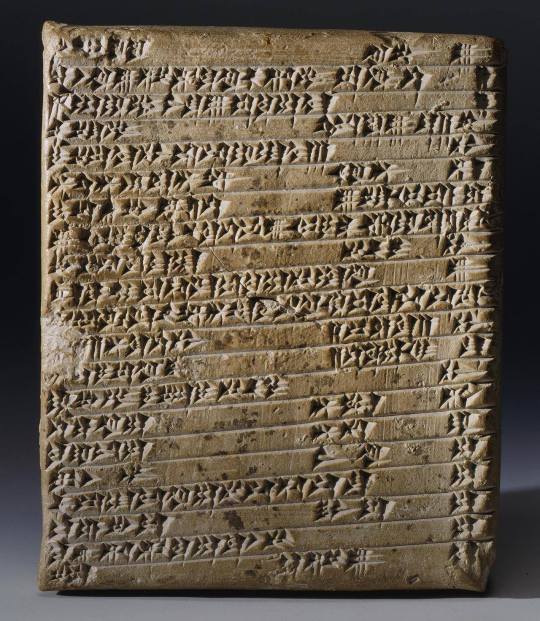
Babylonian prayer to the Gods of the Night pullulū rubû wašrū sikkūrū šīrētum šaknā ḫabrātum nišū šaqummā petûtum uddulū bābū ilī mātim ištarāt mātim Šamaš Sîn Adad Ištar īterbū ana utul šamê ul idinnū dīnam ul iparrasū awātim pussumat mušītim ēkallum šaḫūrša kummu adrū ālik urḫim ilam išassi u ša dīnim ušteberre šittam dayyān kinātim abi ekiātim Šamaš īterub ana kummīšu rabûtum ilī mušītim nawrum Girra qurādum Erra qaštum nīrum šitaddarum mušḫuššum ereqqum inzum kusarikkum bašmum lizzizū-ma ina têrti eppušu ina puḫād akarrabu kittam šuknān šumūšu ikrib mušītim (TRANSLATION) The princes are closely guarded, The locking-bolts lowered, the locking rings placed, (Though previously) noisy, the people are silent, (Though previously) open, the doors are locked. The gods of the land (and) the goddesses of the land, Shamash, Sin, Adad and Ishtar Have entered into the lap of heaven. They do not render judgment, they do not decide a case. The night is veiled. The palace, its chapel, the cella are obscured. The traveler invokes god, but the one (who offers) a decision remains asleep. The judge of truth, father of the impoverished girl, Shamash has entered his cella. The great ones, the gods of the night, Bright Girra, Warrior Erra, The Bow, the Yoke, Orion, the Furious Serpent, The Wagon, the Goat, The Bison, the Horned Serpent, May they stand by so that, In the extispicy I am performing, In the lamb I am offering, You may place the truth Alan Lenzi. Reading Akkadian Prayers & Hymns: an Introduction. Society of Biblical Literature. pp. 71-82. Plate with Cuneiform Script: Pray to the Night Gods. Place of origin: Ancient East, Babylonia Date: Early 2nd millennium B.C. Medium: Clay
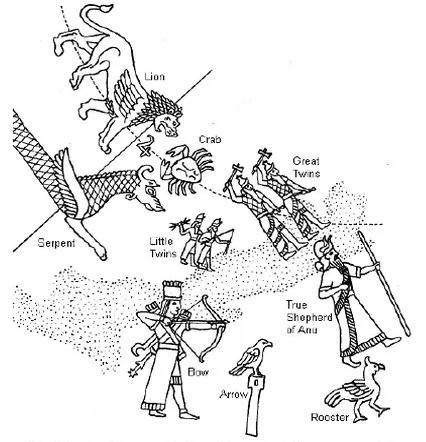
This is an extispicy prayer that used to be recited when performing divination at night. Its logic follows that, as the city’s activity declines for the night, the main gods retire as well, which makes sense as nighttime was probably very dangerous in ancient times. So instead one ought to seek the guidance of the ilī mušītim “gods of the night”. Here the term refers to the stars and constellations, plus fire god Girra (also called Gibil) and the fierce war-and-plague god Erra (syncretized with Nergal).
The constellation the Babylonians called the Bow, qaštum, is probably part of Canis Major, and the Yoke is Boötes. Orion was called Šitadarrum, Šitadallum or Šidallum, often spelled using the Sumerian logograms SIPA.ZI.AN.AN, meaning “the true shepherd of heaven”. The serpent is Mušḫuššum, one of the 11 chaos monsters reared by Tiamat, but tamed by Marduk and made into his pet in the Enuma Elish. It possibly referred to the Hydra constellation. The Wagon is famously Ursa Major and the Goat is Lyra. The Bison and Bašmum, “horned serpent”, however, are still unidentified.
The appellation “gods of the night” also appears in another prayer as part of the Maqlû (burning) rituals, a series of exorcisms and uncrossings performed in the small hours all the way until dawn.
This prayer unfortunately isn’t that useful for the modern pagan, as it’s a bit too specific, but one may find some use still in the lines rabûtum ilī mušītim / nawrum Girra / qurādum Erra / qaštum nīrum / šitaddarum mušḫuššum / ereqqum inzum / kusarikkum bašmum/ lizzizū (“The great ones” down to “may they stand by”) in nightly stellar invocations for whatever maybe-not-quite-licit matters you may want to perform.
(If you plan on singing or reciting this, please remember that “š” sounds like the English “sh” and “ḫ” is guttural)
May the gods be praised!
121 notes
·
View notes
Text


☆﹔Flower & Spring themed names
Poppy , azalea , iris , aster , flora , abelia , cedar , aspen , daphne , acacius , cordelia , poppy , elowen , clover , willow , sylvie , juniper , amaryllis , sage , rosalie , marigold , maren , cynthia , magnolia , cassia , ione , zephyr , lennox , sylvia , cassiopeia , elara , rosalind , fleur , pandora , rue , linnea , ewan , lilac , aveline , ianthe , florian , Iris , Calla , Flora , Heather , Rose , Zinnia , Aster , Clover , Dahlia , Daisy , Erica , Ivy , Kalina , Lily , Violet , Blossom , Bluebell , Hyacinth , Jasmine , Lavender , Leilani , Flora , Fleur, Floor, Flora , Flora, Flower
☆﹔Flower & Spring themed pronouns
petal/petals/petalself , sprout/sprouts/sproutself , stem/stems/stemself, leaf/leafs/leafself , bud/buds/budself , fleur/fleurs/fleurself , bloom/blooms/bloomself , fern/ferns/fernself , ama/amara/amaran/amaranth/amaranself , bloom/blooms/bloomself , bo/bel/oss/bloss/blossomself or blosself , bud/buds/budself , ca/cam/mel/mellia/camelliaself or camellself , ca/car/carna/carnati/carnationself , ca/uc/yuc/ucca/yuccaself , co/lum/bi/bine/columbineself or columself , dai/daisy/dais/dais/daisyself , do/dog/gwo/gwod/dogwoodself , fir/firs/firself , fleur/fleurs/fleurself , flo/flor/flori/florid/floridself , flor/flora/floraself , flow/flower/flowers/flowerself , frie/friez/freesi/freesi/freesiaself , fu/fuch/uch/uchia/fuchsiaself , ha/hib/bis/cus/hibiscuself , haw/hawth/thor/thorn/hawthornself or hawthself , hy/cin/hyas/hyacin/hyacinthself or hyaself , hy/hys/hyself (hyacinth) , ir/ir/iris/iri/iriself , ja/min/jas/jasmi/jasmineself , je/min/jes/jessa/jessamineself , lil/lily/lils/lilies/lilself/lilyself , lo/lot/lotu/lotus/lotuself , ma/mag/nol/nolia/magnoliaself or noliaself , nar/narc/narcir/narcirs/narcself (soft c as in certain, narcissus) , pe/peony/peo/peon/peonyself , pe/per/peri/peri/periself or periwinkle , petal/petals/petalself , po/pop/py/oppy/poppyself , rho/rhod/rhode/rhodes/rhodeself , rie/orch/id/chid/orchidself, orchiself, or orchself , ro/ros/rose/roses/roseself , rose/roses/roseself , sa/sap/saps/saps/sapself , sy/syr/rin/ringa/syringaself , ti/tul/ul/uli/tulipself , to/mis/misel/miselt/mistletoeself , tul/tulip/tulips/tulips/tulipself , vi/viol/viols/viols/violself (violet) , wi/win/winkle/winkle/winkleself or periwinkle , wi/wist/wis/wister/wisteriaself, wistself, or wisterself , zi/zin/zin/zinni/zinniaself , moss/moss/mosses/mosses/mosself , shroom/shroom/shrooms/shrooms/shroomself , spring/spring/springs/springs/springself , dew/dew/dews/dews/dewself , shine/shine/shines/shines/shineself , flower/flower/flowers/flowers/flowerself , honey/honey/honeys/honeys/honeyself
#did system#selfishness#plural system#pretty#pronouns#suggestion#neoprns#xenopronouns#neopronouns#neogender#plants#plantbased#plant neos#spring#spring neo#name hoard#character names#names#name list#trans names#name ideas#name suggestions#npt suggestions#npt blog#npt help#npt list#npt#reqs open
39 notes
·
View notes
Text
Learn Korean with me - Week 19
Day 1 - 3: Vocab
** Don't forget your journals and of course Netflix.
꿉니다 Kkum ni da Dream/dreams/to dream
도서관 Do seo gwan Library/libraries
고마워 Go ma wo Thanks
잠 Jam Sleep/slumber
남자 Nam ja Man
아이스크림 A I seu keu rim Ice cream
배스킨라빈스 Bae seu kin ra bin seu Baskin Robbins
아이 A i Child
콜라 Kor ra Cola
아파트 A pa teu Apartment
또는 Tto neun Or/either
여자 Yeo ja Woman
우의 U ui Friendship/raincoat
우유 U yu Milk
뽀뽀 Ppo ppo Kiss
듀오링고 Dyu o ring go Duolingo
여자아이 Yeo ja a i Girl
여자들 Yeo ja deur Women
아니요 A ni yo No
남자아이 Nam ja a i Boy
개 Gae Dog
학생 Hag saeng Student
가수 Ga su Singer
제 Je My
고양이 Go yang i Cat
음식 Eum sig Food/cook
한국 Han gug Korea
메시지 Me si ji Message
도넛 Do neos Doughnut
신문 Sin mun Newspaper
씨 Ssi Seed/Ms/Mr
집 Jib House
파티 Pa ti Party
부산 Bu san Busan
서울 Seo ul Seoul
맥도날드 Maeg do nar deu McDonald’s
모터스 Mo teo seu Motors
삼성 Sam Seong Samsung
도쿄 Do kyo Tokyo
블루윙즈 Beur ru wing seu Bluewings
유나이티드 Yu na I ti deu United
드래곤즈 Deu rae gon jeu Dragons
뉴욕 Nyu yog New York
스타벅스 Seu ta beog seu Starbucks
런던 Reon deon London
사과 Sa gwa Apple
연필 Yeon pir Pencil
개미 Gae mi Ant
방 Pang Room
수영합니다 Su yeong hab ni da Swim/swims/is swimming
#Learning Korean#Korean#Hanguel#BTS#Bangtan#RM#Jin#Suga#J Hope#Jimin#V#Jungkook#South Korea#Korea#motivation#that girl#badass#glow up#Military Wife#We Will Wait#2025#travel#self care#self improvement#love#borahae#fighting#no more excuses#2024
23 notes
·
View notes